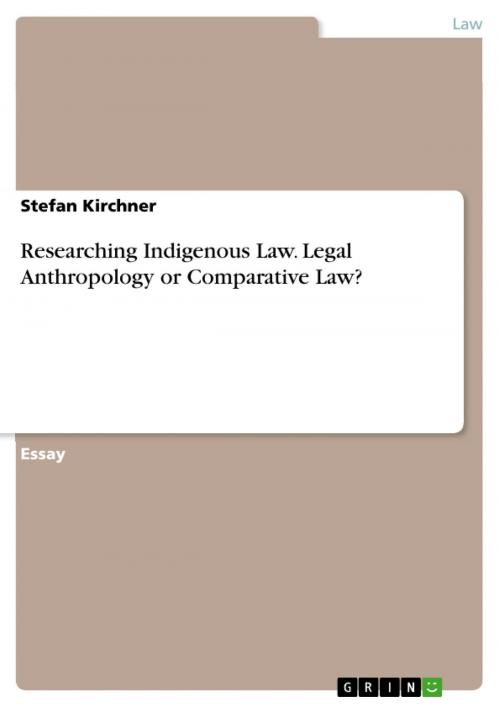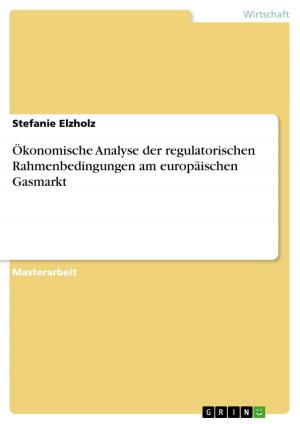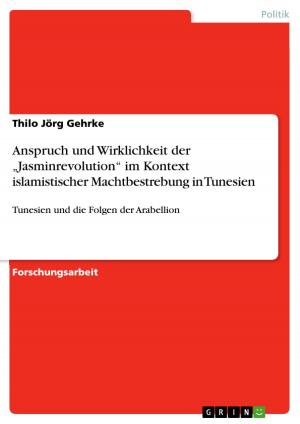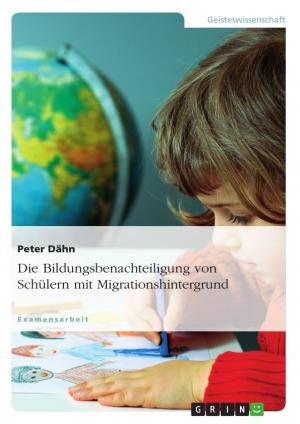Researching Indigenous Law. Legal Anthropology or Comparative Law?
Nonfiction, Reference & Language, Law, International| Author: | Stefan Kirchner | ISBN: | 9783668010925 |
| Publisher: | GRIN Verlag | Publication: | July 3, 2015 |
| Imprint: | GRIN Verlag | Language: | English |
| Author: | Stefan Kirchner |
| ISBN: | 9783668010925 |
| Publisher: | GRIN Verlag |
| Publication: | July 3, 2015 |
| Imprint: | GRIN Verlag |
| Language: | English |
Essay from the year 2015 in the subject Law - Comparative Legal Systems, Comparative Law, , language: English, abstract: In developed countries, indigenous peoples are often portrayed as (noble) savages or as remnants from an other age. However, they are neither. While being different from the majority population, and all too often having been (and often continuing to be) oppressed, in recent years a change has become visible in the attitude towards indigenous peoples. Indigenous peoples are first of all that, peoples - with their own cultures and histories. It is because of their particular lifestyle and relationship with an other culture, that they are seen as different. However, more and more indigenous peoples are taken more seriously in their own right. In this essay the research of indigenous legal norms by outsiders is investigated from the perspective of indigenous rights. Based on a premise of respect for indigenous norms, issues such as benefit sharing and access to research results are discussed, as well as research ethics.
Docent Dr. Stefan Kirchner, Assessor jur., MJI is Associate Professor for Arctic Law at the Arctic Centre of the University of Lapland in Rovaniemi, Finland, and Adjunct Professor of Fundamental and Human Rights at the same university. His work focuses on the crossroads of human rights, the environment, shared areas, in particular the oceans and outer space, and international business and trade. Prior to joining the Arctic Governance Research Group at the Arctic Centre he taught public law, international law and civil rights as Visiting Professor for Transitional Justice at the University of Turin (Italy), University Lecturer and Associate Professor for Fundamental and Human Rights, with a Special Focus on Indigenous Rights, at the Faculty of Law of the University of Lapland in Rovaniemi (Finland), Assistant Professor for International Law and Associate Professor for the Law of the Sea at Vytautas Magnus University in Kaunas (Lithuania), scientific employee in the Department of Public Law of the Faculty of Law of Georg-August-University in Göttingen (Germany), and Visiting Lecturer at the Institute of International Relations at Tars Shevchenko National University in Kyiv (Ukraine) and at the Faculty of Law Justus-Liebig-University in Giessen (Germany). Formerly a practising lawyer (Rechtsanwalt) in Germany for over a decade, he has worked on international trade law, corporate law, the law of the sea and human rights law, including cases at the German Federal Constitutional Court (Bundesverfassungsgericht), the German Federal Supreme Court (Bundesgerichtshof), the German Federal Administrative Court (Bundesverwaltungsgericht) and the European Court of Human Rights. In addition, he served as legal agent for Germany's Federal Maritime and Hydrographic Agency, working on international shipping law, oil pollution and seafarer training issues. Dr. Kirchner is active in a number of professional organizations and is a regular reviewer for a number of academic publishing houses and academic journals, a member of editorial boards for several international academic journals and has written over one hundred academic articles and book chapters. He has been an evaluator of research projects for the Norwegian Academy of Sciences and Letters. Prior to his legal career he worked as a freelance journalist in Germany, as an emergency medical technician (Rettungssanitäter) for the German Red Cross and as a factory worker for a company producing transformers.
Essay from the year 2015 in the subject Law - Comparative Legal Systems, Comparative Law, , language: English, abstract: In developed countries, indigenous peoples are often portrayed as (noble) savages or as remnants from an other age. However, they are neither. While being different from the majority population, and all too often having been (and often continuing to be) oppressed, in recent years a change has become visible in the attitude towards indigenous peoples. Indigenous peoples are first of all that, peoples - with their own cultures and histories. It is because of their particular lifestyle and relationship with an other culture, that they are seen as different. However, more and more indigenous peoples are taken more seriously in their own right. In this essay the research of indigenous legal norms by outsiders is investigated from the perspective of indigenous rights. Based on a premise of respect for indigenous norms, issues such as benefit sharing and access to research results are discussed, as well as research ethics.
Docent Dr. Stefan Kirchner, Assessor jur., MJI is Associate Professor for Arctic Law at the Arctic Centre of the University of Lapland in Rovaniemi, Finland, and Adjunct Professor of Fundamental and Human Rights at the same university. His work focuses on the crossroads of human rights, the environment, shared areas, in particular the oceans and outer space, and international business and trade. Prior to joining the Arctic Governance Research Group at the Arctic Centre he taught public law, international law and civil rights as Visiting Professor for Transitional Justice at the University of Turin (Italy), University Lecturer and Associate Professor for Fundamental and Human Rights, with a Special Focus on Indigenous Rights, at the Faculty of Law of the University of Lapland in Rovaniemi (Finland), Assistant Professor for International Law and Associate Professor for the Law of the Sea at Vytautas Magnus University in Kaunas (Lithuania), scientific employee in the Department of Public Law of the Faculty of Law of Georg-August-University in Göttingen (Germany), and Visiting Lecturer at the Institute of International Relations at Tars Shevchenko National University in Kyiv (Ukraine) and at the Faculty of Law Justus-Liebig-University in Giessen (Germany). Formerly a practising lawyer (Rechtsanwalt) in Germany for over a decade, he has worked on international trade law, corporate law, the law of the sea and human rights law, including cases at the German Federal Constitutional Court (Bundesverfassungsgericht), the German Federal Supreme Court (Bundesgerichtshof), the German Federal Administrative Court (Bundesverwaltungsgericht) and the European Court of Human Rights. In addition, he served as legal agent for Germany's Federal Maritime and Hydrographic Agency, working on international shipping law, oil pollution and seafarer training issues. Dr. Kirchner is active in a number of professional organizations and is a regular reviewer for a number of academic publishing houses and academic journals, a member of editorial boards for several international academic journals and has written over one hundred academic articles and book chapters. He has been an evaluator of research projects for the Norwegian Academy of Sciences and Letters. Prior to his legal career he worked as a freelance journalist in Germany, as an emergency medical technician (Rettungssanitäter) for the German Red Cross and as a factory worker for a company producing transformers.















